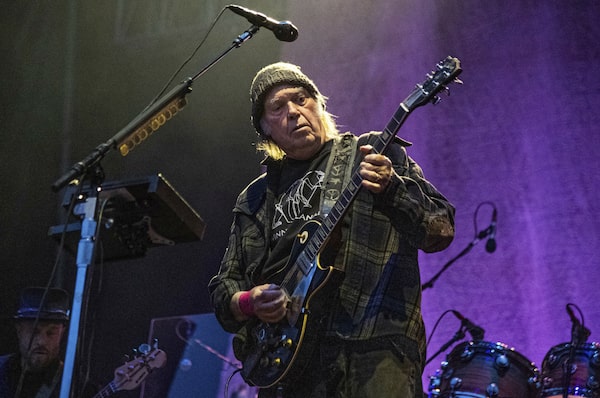
Neil Young performs at the BottleRock Napa Valley Music Festival at Napa Valley Expo in Napa, Calif., on May 25, 2019.Amy Harris/The Associated Press
This jab’s for you, Spotify and Joe Rogan.
In an open letter to his management and his record label earlier this week, Neil Young demanded that his music be removed from the streaming service behemoth Spotify. “I am doing this because Spotify is spreading fake information about vaccines – potentially causing death to those who believe the disinformation being spread,” the Canadian rocker wrote on his Neil Young Archives website.
Young’s original post was deleted, but on Wednesday, the musician posted a new letter indicating that Warner has agreed to his request.
“Thank you WARNER BROTHERS for standing with me and taking the hit,” Young wrote.
Warner has not commented publicly, and also declined the Globe’s request for a statement on the issue. Spotify said they “regret Neil’s decision to remove his music from Spotify, but hope to welcome him back soon.”
Young takes issue with Rogan, the controversial and popular Spotify podcast host who the singer believes misleads on matters of masking and unproven COVID-19 remedies. “I want you to let Spotify know immediately TODAY that I want all my music off their platform,” he continued. “They can have Rogan or Young. Not both.”
The ornery singer and activist, whose 1988 song This Note’s for You is an antagonistic commentary on corporate concert sponsorship, hasn’t toured since the pandemic began almost two years ago. “I’m still not playing anywhere,” Young told The Globe and Mail last December, upon the release of his album Barn. “I don’t want to. I don’t think we’re ready. I don’t want to be part of a superspreader event. I’m waiting until we get a grip on what we’re doing.”
Young is decidedly pro-vaccine, having suffered from polio as a child (as did Joni Mitchell). His fiery righteousness comes at a time when other rock-star elders are disappointing people at all turns.
Last week, Bono trashed his own legacy when he said that many U2 songs make him cringe today. “I’ve been in the car when one of our songs has come on the radio and I’ve been the colour of, as we say in Dublin, scarlet,” Bono said in a Hollywood Reporter podcast. “I’m just so embarrassed.”
It was a thoughtless remark. The music of U2, for better or worse, means a lot to millions of people. In a self-serving attempt to appear humble, Bono trashed the tastes and the loyalty of his fans. The man who once sang “I want to run, I want to hide” would do well to heed that impulse.
Legendary guitarist Eric Clapton’s long, sad descent into irrelevancy continued with more of his anti-vaccine discourse. In a Real Music Observer interview on YouTube, he said people were being persuaded to accept masking and vaccines through “mass hypnosis formation.”
And then there’s British musician Damon Albarn, frontman of the bands Blur and Gorillaz, who disrespected Taylor Swift in an interview with the Los Angeles Times, saying she “doesn’t write her own songs” and that co-writing “doesn’t count.”
Albarn, it should be noted, is famous for writing a “woo-hoo” chorus. After the social-media savvy Swift fired back at him on Twitter, Albarn issued an apology. What’s interesting about Swift’s post to Albarn is that she professed to being “such a big fan” of his. She was only 11 when Blur’s Song 2 was released.
The adage “never meet your heroes,” then, is proving to be sound advice. The comments from Clapton, Bono and Albarn – don’t even mention Van Morrison – are a total drag.
Young has some advice for that: “Don’t let it bring you down, it’s only castles burning,” he sang in 1970. “Find someone who’s turning, and you will come around.”
This week, Young just happens to be that someone.
Sign up for The Globe’s arts and lifestyle newsletters for more news, columns and advice in your inbox.
 Brad Wheeler
Brad Wheeler